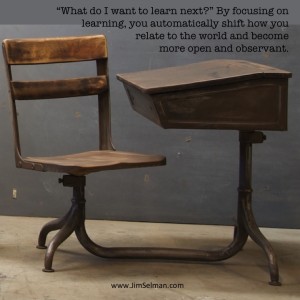 In my blog “Middle Class Meltdown” earlier this month, I suggested that more and more Americans are creating their own jobs by making offers.
In my blog “Middle Class Meltdown” earlier this month, I suggested that more and more Americans are creating their own jobs by making offers.
Essentially, I was suggesting that more and more of us are stepping up to the fact that at the end of the day, each of us is solely responsible for our livelihood and we succeed by adding value in whatever ways we can. We contribute value and value is rewarded. What is less obvious is that our value is a function of what others value, not what we think is valuable. Finding our value means listening deeply to other people’s concerns and learning to observe what is needed and wanted or missing in a given situation.
As straightforward as that may sound, it is remarkably difficult to confront how much of our training and our thinking revolves around our own point of view. We actually think that our point of view — what we think — is what is happening around us. We believe that if we think something is valuable then others will see it the same way. We then go about the business of selling or persuading others to agree with us. Depending upon how good we are at convincing others to agree with our point of view, we may or may not succeed. Even when we succeed, however, we are facing a long process of trying to ‘push’ our product or service rather than create an offer into a concern that can pull for whatever it is we are offering.
 This is not to say that successful entrepreneurs don’t occasionally hit on something of value that people don’t know they need or want. Most of the Internet killer apps from Google to GPS to Facebook were unimaginable when launched and indispensable today. But these are few and far between. The vast majority of indepreneurs today are making offers to take care of some concern in a more efficient or higher-quality way, or in a way that adds value in terms of a customer’s experience, whether through service or relationship, or simply relate to the customers concern as unique for them. In some cases, what begins as a modest offer can explode into a large enterprise such as what has happened with Uber and AirBNB.
This is not to say that successful entrepreneurs don’t occasionally hit on something of value that people don’t know they need or want. Most of the Internet killer apps from Google to GPS to Facebook were unimaginable when launched and indispensable today. But these are few and far between. The vast majority of indepreneurs today are making offers to take care of some concern in a more efficient or higher-quality way, or in a way that adds value in terms of a customer’s experience, whether through service or relationship, or simply relate to the customers concern as unique for them. In some cases, what begins as a modest offer can explode into a large enterprise such as what has happened with Uber and AirBNB.
Here are some tips I’ve shared with hundreds of indepreneurs that have proven useful when they “step out on their own,” and face the world with nothing behind them, other than what they’re offering and their network of family, friends and associates.
- Ask, “What do I want to learn next?” Too often, we begin the process of formulating an offer by focusing on what we can do, what we like to do or what we think we’re good at. This is despite the fact that things are changing so quickly that by the time you figure it out, the market has moved on or an army of potential competitors have arrived at the same conclusion. By focusing on learning, you automatically shift how you relate to the world and become more open and observant.
- Create a small “brain trust” of friends or advisors to challenge your thinking. Not as devil’s advocates, but as committed co-creators of an idea and people who are committed to your success.
- Learn the difference between enrolling and selling. When you can enroll others in what you have to offer, you’re on the right track. The difference between these two terms is that when enrolling, you are committed to what others are committed to. When selling you are trying to get others to be committed to what you are committed to.
- Practice creating scenarios or likely stories from the perspective of the future you want to have — from the perspective of your vision for what you are offering. This is a mindset as much as a planning tool. Do not be the coach who lets the game decide who wins, start from having already succeeded, then imagine, “How did I do it?” By speaking in the past tense you have virtually no constraints and lots of freedom to think outside the box.
- Test your assumptions. The best marketing people know that our assumptions are wrong more often than not, at least initially. I am a great believer in writing a brochure and enrolling a few clients first before investing a lot of effort in detail design or building a prototype. In the movie Field of Dreams, the message was, “build it and they will come.” In today’s world it is more prudent to say, “sell it and then we’ll build it.” This is not the case for very visionary projects, which as I’ve said, may be the exception.
- Keep the faith. For any startup or when making any offer, it is important to acknowledge that you are willing for the other person to say no. If not, you are selling and in the final analysis manipulating the buyer. At best, a short term strategy and rarely satisfying or the basis for long term and expanding enterprise. Learn to use resistance, if there is any, to improve your offer.
- Charge what the result is worth, not what it costs to provide it.
I know a number of brilliant indepreneurs who are undervaluing what they are offering either because they lack confidence, or because they are embarrassed about putting a value on something that comes naturally for them. Charge what is appropriate to the value offered.
 Indepreneurs are not simply “free-lancers” and “part-timers.” They are serious about creating themselves and what they offer as a sustainable, and hopefully lucrative, business. They must have the mindset of anyone starting a business, at times willing to fill all roles necessary. They need to take care of their own wellbeing and have some fun. Most importantly, despite success or failure, they must find satisfaction in the world that they create. I love the anonymous quote that has been on my desk for the last 40 years, “Make no little dreams, they have no magic in the events of men.”
Indepreneurs are not simply “free-lancers” and “part-timers.” They are serious about creating themselves and what they offer as a sustainable, and hopefully lucrative, business. They must have the mindset of anyone starting a business, at times willing to fill all roles necessary. They need to take care of their own wellbeing and have some fun. Most importantly, despite success or failure, they must find satisfaction in the world that they create. I love the anonymous quote that has been on my desk for the last 40 years, “Make no little dreams, they have no magic in the events of men.”
